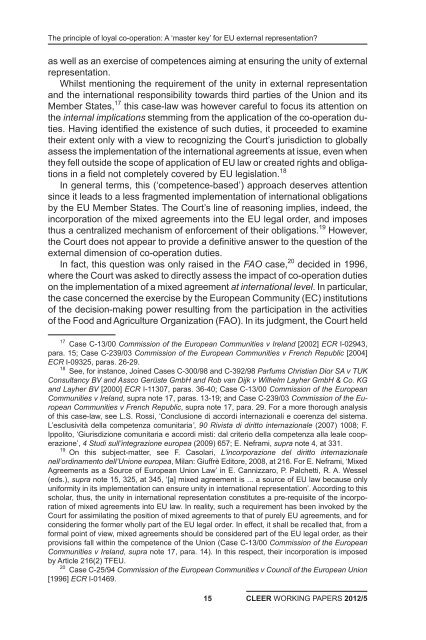Principles and practices of EU external representation - TMC Asser ...
Principles and practices of EU external representation - TMC Asser ...
Principles and practices of EU external representation - TMC Asser ...
You also want an ePaper? Increase the reach of your titles
YUMPU automatically turns print PDFs into web optimized ePapers that Google loves.
The principle <strong>of</strong> loyal co-operation: A ‘master key’ for <strong>EU</strong> <strong>external</strong> <strong>representation</strong>?<br />
as well as an exercise <strong>of</strong> competences aiming at ensuring the unity <strong>of</strong> <strong>external</strong><br />
<strong>representation</strong>.<br />
Whilst mentioning the requirement <strong>of</strong> the unity in <strong>external</strong> <strong>representation</strong><br />
<strong>and</strong> the international responsibility towards third parties <strong>of</strong> the Union <strong>and</strong> its<br />
Member States, 17 this case-law was however careful to focus its attention on<br />
the internal implications stemming from the application <strong>of</strong> the co-operation duties.<br />
Having identified the existence <strong>of</strong> such duties, it proceeded to examine<br />
their extent only with a view to recognizing the Court’s jurisdiction to globally<br />
assess the implementation <strong>of</strong> the international agreements at issue, even when<br />
they fell outside the scope <strong>of</strong> application <strong>of</strong> <strong>EU</strong> law or created rights <strong>and</strong> obligations<br />
in a field not completely covered by <strong>EU</strong> legislation. 18<br />
In general terms, this (‘competence-based’) approach deserves attention<br />
since it leads to a less fragmented implementation <strong>of</strong> international obligations<br />
by the <strong>EU</strong> Member States. The Court’s line <strong>of</strong> reasoning implies, indeed, the<br />
incorporation <strong>of</strong> the mixed agreements into the <strong>EU</strong> legal order, <strong>and</strong> imposes<br />
thus a centralized mechanism <strong>of</strong> enforcement <strong>of</strong> their obligations. 19 However,<br />
the Court does not appear to provide a definitive answer to the question <strong>of</strong> the<br />
<strong>external</strong> dimension <strong>of</strong> co-operation duties.<br />
In fact, this question was only raised in the FAO case, 20 decided in 1996,<br />
where the Court was asked to directly assess the impact <strong>of</strong> co-operation duties<br />
on the implementation <strong>of</strong> a mixed agreement at international level. In particular,<br />
the case concerned the exercise by the European Community (EC) institutions<br />
<strong>of</strong> the decision-making power resulting from the participation in the activities<br />
<strong>of</strong> the Food <strong>and</strong> Agriculture Organization (FAO). In its judgment, the Court held<br />
17 Case C-13/00 Commission <strong>of</strong> the European Communities v Irel<strong>and</strong> [2002] ECR I-02943,<br />
para. 15; Case C-239/03 Commission <strong>of</strong> the European Communities v French Republic [2004]<br />
ECR I-09325, paras. 26-29.<br />
18 See, for instance, Joined Cases C-300/98 <strong>and</strong> C-392/98 Parfums Christian Dior SA v TUK<br />
Consultancy BV <strong>and</strong> Assco Gerüste GmbH <strong>and</strong> Rob van Dijk v Wilhelm Layher GmbH & Co. KG<br />
<strong>and</strong> Layher BV [2000] ECR I-11307, paras. 36-40; Case C-13/00 Commission <strong>of</strong> the European<br />
Communities v Irel<strong>and</strong>, supra note 17, paras. 13-19; <strong>and</strong> Case C-239/03 Commission <strong>of</strong> the European<br />
Communities v French Republic, supra note 17, para. 29. For a more thorough analysis<br />
<strong>of</strong> this case-law, see L.S. Rossi, ‘Conclusione di accordi internazionali e coerenza del sistema.<br />
L’esclusività della competenza comunitaria’, 90 Rivista di diritto internazionale (2007) 1008; F.<br />
Ippolito, ‘Giurisdizione comunitaria e accordi misti: dal criterio della competenza alla leale cooperazione’,<br />
4 Studi sull’integrazione europea (2009) 657; E. Neframi, supra note 4, at 331.<br />
19 On this subject-matter, see F. Casolari, L’incorporazione del diritto internazionale<br />
nell’ordinamento dell’Unione europea, Milan: Giuffrè Editore, 2008, at 216. For E. Neframi, ‘Mixed<br />
Agreements as a Source <strong>of</strong> European Union Law’ in E. Cannizzaro, P. Palchetti, R. A. Wessel<br />
(eds.), supra note 15, 325, at 345, ‘[a] mixed agreement is ... a source <strong>of</strong> <strong>EU</strong> law because only<br />
uniformity in its implementation can ensure unity in international <strong>representation</strong>’. According to this<br />
scholar, thus, the unity in international <strong>representation</strong> constitutes a pre-requisite <strong>of</strong> the incorporation<br />
<strong>of</strong> mixed agreements into <strong>EU</strong> law. In reality, such a requirement has been invoked by the<br />
Court for assimilating the position <strong>of</strong> mixed agreements to that <strong>of</strong> purely <strong>EU</strong> agreements, <strong>and</strong> for<br />
considering the former wholly part <strong>of</strong> the <strong>EU</strong> legal order. In effect, it shall be recalled that, from a<br />
formal point <strong>of</strong> view, mixed agreements should be considered part <strong>of</strong> the <strong>EU</strong> legal order, as their<br />
provisions fall within the competence <strong>of</strong> the Union (Case C-13/00 Commission <strong>of</strong> the European<br />
Communities v Irel<strong>and</strong>, supra note 17, para. 14). In this respect, their incorporation is imposed<br />
by Article 216(2) TF<strong>EU</strong>.<br />
20 Case C-25/94 Commission <strong>of</strong> the European Communities v Council <strong>of</strong> the European Union<br />
[1996] ECR I-01469.<br />
15<br />
CLEER WORKING PAPERS 2012/5

















